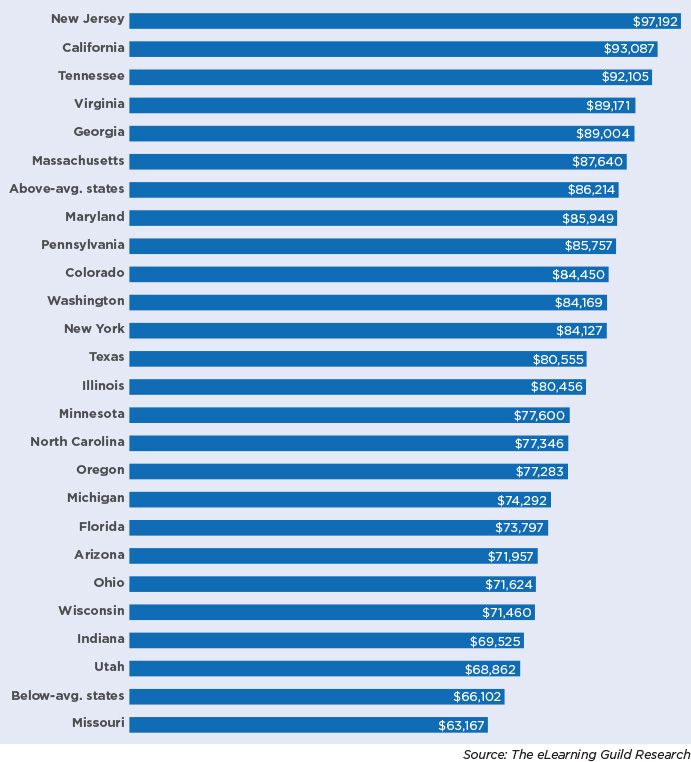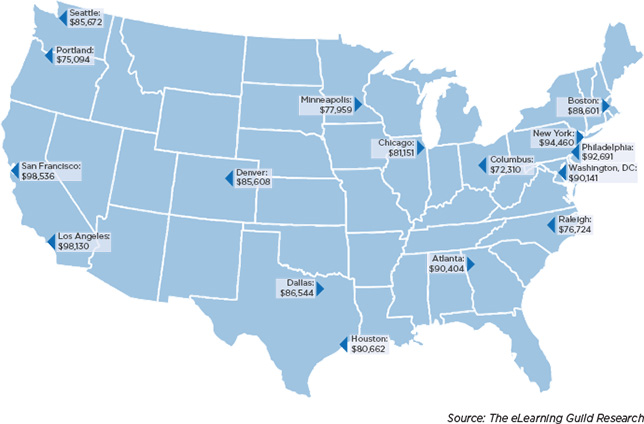The eLearning Guild has released the 2016 US eLearning Salary & Compensation Report, written by Sharon Vipond and Temple Smolen. Based on data collected from more than 3,500 Guild members in the US, the average US base salary decreased to $80,359, which is down 0.89 percent from last year’s US base of $81,079. Note that base salary does not include other types of compensation variables such as bonus, merit increase, continuing education reimbursement, or vacation.
The report, free to Guild members at all levels from Associate to Premium, provides an extensive analysis of industry issues and other compensation variables that determine salary.

Figure 1: Average US eLearning base salaries by state, compared to the national average of $80,359

Figure 2:Average US eLearning base salaries by metropolitan area
The US 2016 eLearning Salary & Compensation Report provides national data obtained from Guild members during calendar year 2015. Key salary components, including industry, sector, company size, educational level, job focus, and gender, are thoroughly examined. Also included are the Guild’s US salary calculator (updated for 2016) and other resources to help you begin salary research and develop an action plan for successful future negotiations.
Findings include:
- Gender-based income disparities are still prevalent in the US. Women report an average salary of $75,561, while men report an average salary of $88,347.
- Average base salaries vary dramatically by state, with a high of $97,192 in New Jersey and a low of $63,167 in Missouri.
- Similarly, average US base salaries vary among metropolitan areas, with a high of $98,536 in the San Francisco metropolitan area and a low of $72,310 in the Columbus, Ohio metropolitan area.
- Over 57% of survey respondents received a merit increase, or a pay raise, within the past year. Note that pay-for-performance monetary rewards may be in the form of an increase in base pay or a one-time “bonus” that is tied to achievement of a specific performance goal.
- Those with doctorate degrees report an average salary 13.1% above the national average.
Employees in the IT/computer consulting profession report salary averages 28% higher than the US national average. Those working in the nonprofit and education (K-12 and university/college) sectors report lower-than-average salaries. As far as job focus, those responsible for executive management earn 63.7% above the US national average salary. People working in business unit management, strategy and planning, and sales/marketing/business development also report salaries above the national average.
Included in the 2016 US eLearning Salary & Compensation Report is a section on action planning and steps to help you get the full benefit of the report’s data and findings. Navigate your way to success by taking advantage of links to best-practice guidelines, reports, tools, and other useful references and reports, including those on global salary issues and trends.
Online Salary Calculator
Learning Solutions Magazine has updated the 2016 Guild Research US Salary Calculator with data from the 2016 US eLearning Salary & Compensation Report. Use the calculator below to compute and compare baseline salaries for your own situation, then read the report for more information.
About The eLearning Guild
The eLearning Guild is the oldest and most trusted source of information, networking, and community for eLearning professionals. As a member-driven organization, the Guild produces conferences, online events, eBooks, white papers, research reports, and Learning Solutions Magazine—all devoted to the idea that the people who know the most about making eLearning successful are the people who produce eLearning every day in corporate, government, and academic settings. Our goal is to create a place where eLearning professionals can share their knowledge, expertise, and ideas to build a better industry—and better learning experiences—for everyone.
Tap into the Guild’s vast well of expertise by becoming a member. For more information about membership levels and benefits, and to join The eLearning Guild, see the Membership Overview on our website.


